Content
- Clinical manifestations
- First signs
- Symptoms
- The relationship between anxiety depression and panic attacks
- Forms of anxiety-depressive disorders
- Differences from psychosis
- Major risk factors
- Stress
- Lack of work
- Drugs and alcohol
- Unfavorable heredity
- Elderly age
- Low level of education
- Severe somatic diseases
- Establishing diagnosis
- Analyzes
- Instrumental diagnostics
- ECG
- Differential diagnosis
- Relief of acute attacks
- Treatment for anxiety-depressive disorder
- Psychotherapy
- Medication
- Homeopathy
- Physiotherapy
- Other methods
- Folk remedies
- Complications and consequences, prognosis
- Anxiety Disorder Videos
Anxiety-depressive disorder is considered a common problem of modern man. Experts say that after a few decades, the symptoms of this disorder will appear as often as the signs of coronary artery disease. That is why, when such a problem appears, it is worth undergoing examination and treatment, which will reduce the likelihood of complications.
Clinical manifestations
Anxiety-depressive disorder is a neurotic disease in which there are disorders in the nervous system, as well as internal organs. The disease is difficult to diagnose because its symptoms resemble many mental and neurological pathologies.
Experts divide symptoms into clinical manifestations from the nervous system and autonomic symptoms from the internal organs. The first clinical manifestations are poorly expressed and the patient does not attach importance to them. There is a deterioration in memory and a decrease in concentration.
After a while, sleep problems appear, persistent insomnia is noted, which leads to the development of other disorders. The patient becomes irritable, his mood changes sharply, mental performance is sharply reduced.
The most important clinical manifestation of the disorder is a constant feeling of anxiety for no apparent reason. The patient thinks that soon something terrible, irreparable will happen. He retains a strong sense of impending disaster.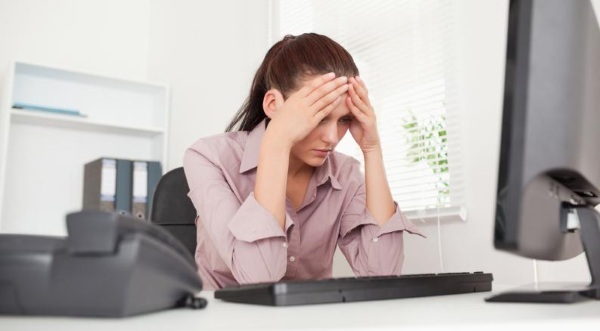
These manifestations not only disrupt sleep, but also affect the patient's behavior. He becomes suspicious, aggressive, avoids communication even with close relatives. Gradually, anxiety becomes the most important symptom of the disorder, other symptoms are less pronounced. It hurts quickly, but physical fatigue is much less than emotional.
With a long course of the process, excessive concern for loved ones is noted. The patient constantly thinks that his relatives are expecting any troubles that he cannot prevent. This only makes the situation worse, the person's behavior becomes inadequate.
First signs
Anxiety-depressive disorder (symptoms and treatment bothers patients of different ages) does not develop suddenly. In most cases, the first signs do not cause concern, and the patient attributes them to manifestations of stress or overwork.
The most common symptoms are:
- Waking up several times throughout the night for no reason.
- Deterioration of mood at the slightest nuisance.
- Too harsh reaction to external stimuli.
After a while, the patient notes that the sleep has become shallow, short and restless. This worsens his health and mood, headaches appear. It is worth noting that such pains are not relieved by conventional analgesics, which also makes the patient more irritable.
Symptoms
As the disorder progresses, manifestations appear on the part of internal organs and systems.
The most pronounced autonomic disorders:
- Tremors of the limbs and tremors all over the body.
- Increased heart rate and heart rhythm disturbances.
- Shortness of breath even with little exercise.

- Frequent urge to urinate.
- Pain in the solar plexus area, reminiscent of the discomfort that occurs with angina pectoris or coronary heart disease.
- Enhanced work of the sweat glands, which manifests itself in the form of constantly wet palms.
- Feeling of the presence of a "lump in the throat." Often, the manifestation is confused with a symptom of hyperthyroidism with an increase in the size of the thyroid gland.
- Disorders of the digestive tract in the form of abdominal pain, loss of appetite and upset stools. At the same time, symptoms may differ from patient to patient. Some talk about constipation, others about frequent loose stools.
- Pain in joints and muscles.
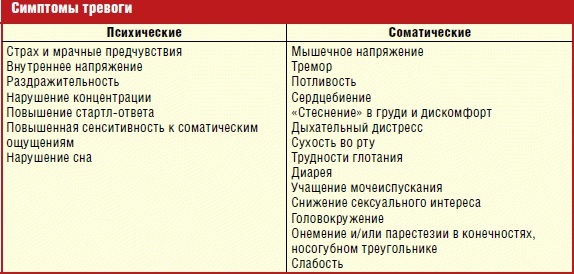
It should be noted that in patients suffering from any chronic diseases of internal organs, there is a deterioration in the course of these pathologies, a significant aggravation of symptoms.
The relationship between anxiety depression and panic attacks
Anxiety-depressive disorder is often associated with panic attacks because symptoms resemble this neurological disorder, and treatment is often done with similar medications.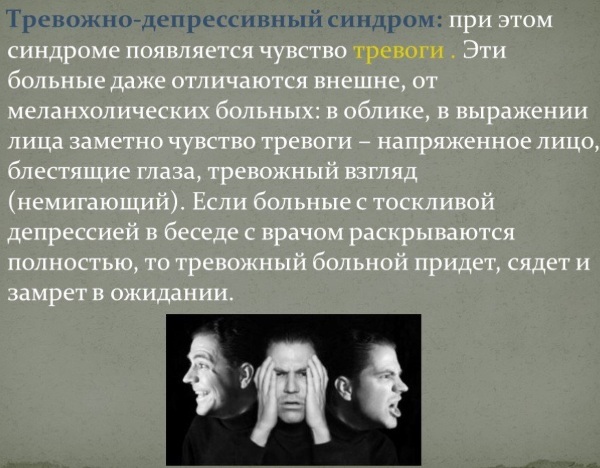
The main relationship is that with constant anxiety and the manifestation of depression, the patient will certainly develop panic attacks. It is worth noting that they manifest themselves differently in different patients. As a rule, panic attacks develop with a prolonged course of anxiety-depressive disorder and the addition of symptoms from the nervous system.
Forms of anxiety-depressive disorders
There is no generally accepted and approved classification of anxiety-depressive disorders. However, experts conditionally divide the pathology into several forms, depending on the severity of a particular symptom.
| Form | Peculiarities |
| Neurological | With this form of pathology, the patient has the most pronounced symptoms from the nervous system. He talks about headaches and mental impairment. The patient's memory deteriorates significantly, his performance decreases. |
| Somatic | This form is considered less common than the first, since it is characterized by severe symptoms from the internal organs. In some patients, disorders of the heart and blood vessels appear, in others - from the digestive and urinary systems. |
| Hormonal | This form develops more often in women of reproductive age. Symptoms may mimic hormonal imbalance. There is a disorder of the menstrual cycle, deterioration of the condition of the skin, hair and nails. |
In addition, doctors distinguish 3 stages of the disease, depending on the degree of its neglect. At the initial stage, only mild symptoms from the nervous system appear in the form of irritability, sleep disorders. At a progressive stage, the manifestations are aggravated, disorders from the internal organs join.
The neglected stage is accompanied by an increase in anxiety and anxiety, aggravation of the symptoms of the previous stages. At the same time, there is a drop in self-esteem, pronounced apathy, a sharp change in mood with a predominance of negative emotions.
Differences from psychosis
Anxiety-depressive disorder (symptoms and treatment are often interrelated, since medications are selected depending on the severity of manifestations) at an advanced stage are often mistaken for psychosis. But experts note that the latter condition has some signs that are absent in anxiety syndrome.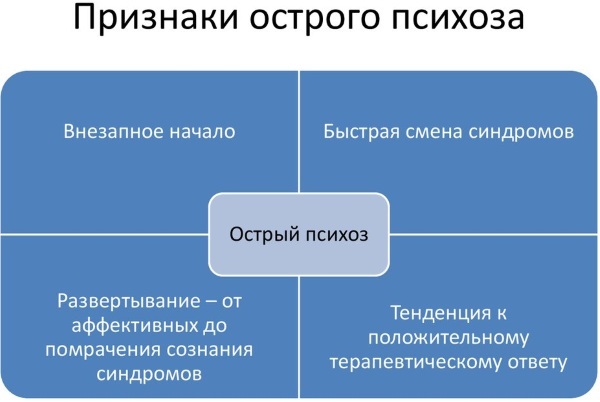
In psychosis, symptoms appear suddenly, but immediately after any severe stress. The patient cannot control his actions, all emotions are manifested vividly. Symptoms from the internal organs are also present, but appear only with an exacerbation of the condition.
This means that headaches, increased blood pressure and increased heart rate are observed only during periods of panic. Excessive physical activity in psychosis also manifests itself only during periods of exacerbation.
With anxiety-depressive disorder, the patient is often passive, interest in life is weak, and symptoms from the internal organs are constantly present.
Major risk factors
The disorder is considered a disease of our time, since a person today is daily exposed to various nervous loads that disrupt the normal functioning of the body.
Stress
Stressful situations accompany a modern person constantly. Trouble at work, a busy schedule, and a lack of balance between work and rest will inevitably lead to anxiety.
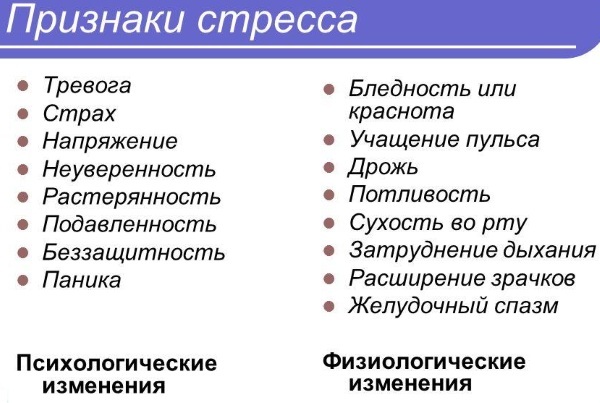
Gradually, this state becomes familiar to a person. He does not feel relief even during rest or after completing some important task.
Lack of work
Despite the stress associated with intense work, the lack of a permanent position also leads to the development of the disorder. A person constantly experiences anxiety, fear for the future of his family. As a result, nervous tension turns into a serious illness, which is aggravated if a person fails to solve the problem for a long period.
Drugs and alcohol
Patients who regularly and in large quantities consume alcoholic beverages, as well as narcotic substances suffer from anxiety-depressive disorder much more often than people leading a healthy lifestyle life.
Unfavorable heredity
Many mental illnesses are hereditary. In anxiety-depressive disorder, hereditary factors also play an important role. Complicated heredity is considered the first factor that is taken into account when diagnosing a condition.
Elderly age
In patients over 60 years of age, the risk of developing such a disorder increases. This is due to the deterioration of the nervous system, the death of neurons in large numbers. In addition, anxiety and other symptoms more often appear in patients who suffer from any chronic pathologies of internal organs.
Low level of education
It is generally accepted that people with higher education suffer from mental disorders more often. However, this rule does not always work.
Doctors note that uneducated patients are more anxious because they cannot explain many things.
Severe somatic diseases
Depression is more common in patients with chronic illness.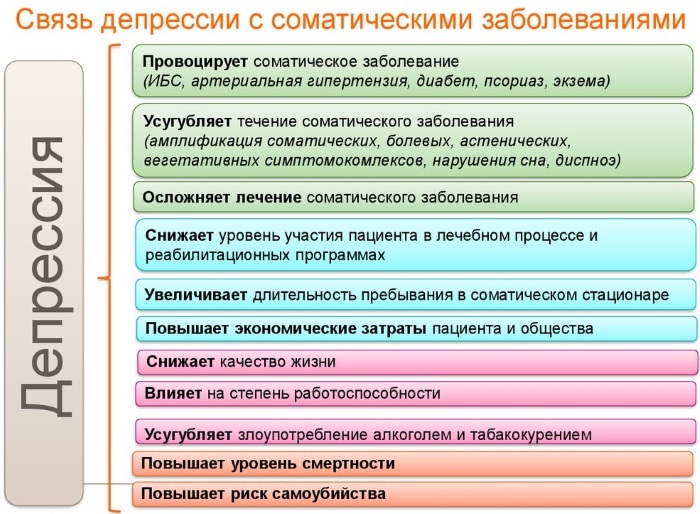 Physical discomfort provokes a deterioration in the condition, in addition, the patient worries about his future, because he cannot predict how the disease will develop.
Physical discomfort provokes a deterioration in the condition, in addition, the patient worries about his future, because he cannot predict how the disease will develop.
Establishing diagnosis
Anxiety-depressive disorder (symptoms and treatment are determined by the doctor based on the patient's emotional state) is difficult to diagnose at an early stage. With an advanced course, diagnosis is facilitated.
Analyzes
There are no specific tests that can confirm the presence of the disorder. However, the standard examination includes a complete blood count. The method helps to detect general abnormalities, signs of inflammation.
Additionally, the patient donates blood for biochemical research. Elderly patients are prescribed a blood test for cholesterol levels, and also determine the tendency to thrombus formation. Women of reproductive age are prescribed a blood test to determine the level of sex hormones and thyroid hormones.
Instrumental diagnostics
Instrumental methods are used to confirm the diagnosis.
The most effective ones:
- Ultrasound of the internal organs is carried out in order to exclude somatic pathologies. The specialist examines the liver, kidneys, gallbladder and pancreas. Sometimes a bladder diagnosis is required.
- X-ray is also necessary to exclude pathologies of the spinal column. Additionally, the doctor can examine bones and joints.
- Electroencephalography or brain diagnostics is necessary to rule out epilepsy, the symptoms of which resemble anxiety disorder.
- MRI is a universal method in which the brain and internal organs are examined in order to detect abnormalities.
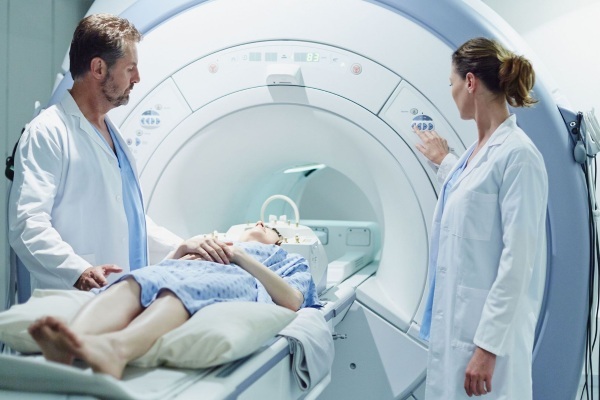
Thanks to instrumental diagnostics, the doctor can exclude or confirm the presence of concomitant deviations.
ECG
An electrocardiogram is considered a mandatory diagnostic method. In this case, the work of the heart is studied, any deviations are noted. Usually, young patients have no symptoms, but with the development of anxiety-depressive syndrome, the heart rhythm is disturbed, tachycardia is observed.
Differential diagnosis
Differential diagnosis is considered the most important in the examination.
It involves identifying pronounced signs and differences from other disorders with similar symptoms:
- In depressive syndrome, the signs of depression are more pronounced than in anxiety-depressive disorder.
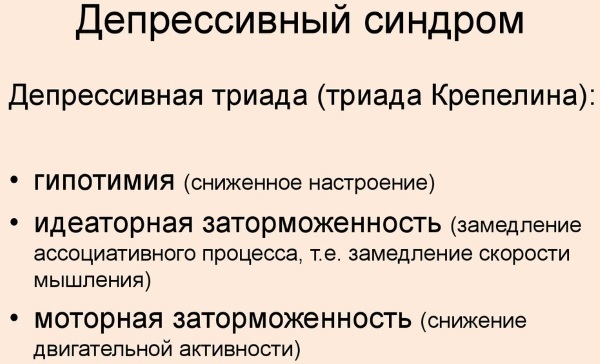
- If the disorder is generalized, the symptoms of anxiety significantly worsen the general condition.
- Somatoform disorder provokes signs from the internal organs, but neurological symptoms are less pronounced.
- In bipolar disorder, the patient has periodic manic episodes and symptoms of depression are more pronounced.
In addition, doctors note that with anxiety-depressive disorder, the patient's quality of life suffers much more than with other diseases.
Relief of acute attacks
In the acute stage, patients develop panic attacks or seizures. They are usually stopped with the help of sedatives and some psychological techniques. It is important for patients and their relatives to remember that seizures are not dangerous and cannot provoke any serious complications.
Algorithm of actions during an attack:
- Sit down or lay down the patient.
- Provide fresh air.
- Unbutton tight clothing.
- Establish eye contact with the patient.
- Calm down the patient with words, speak slowly, the tone should be calm and confident.
- Give the patient water.
- Offer the patient a mild sedative, for example, Valerian tablets in the amount of 3-5 pieces, or motherwort tincture. The dosage in each case is determined individually.
If all these actions do not lead to an improvement in the condition, you should call a doctor.
Treatment for anxiety-depressive disorder
Anxiety-depressive disorder (symptoms and treatment should be discussed with a specialist so that he prescribed the most effective therapy) is treated with medications, physiotherapy and methods psychotherapy.
Psychotherapy
Depending on the course of the pathology, 2 methods of psychotherapy are used. For frequent panic attacks, psychotherapists practice cognitive behavioral therapy. With this method, a specialist at each session teaches the patient to control his thoughts and suppress fear that arises for no apparent reason.
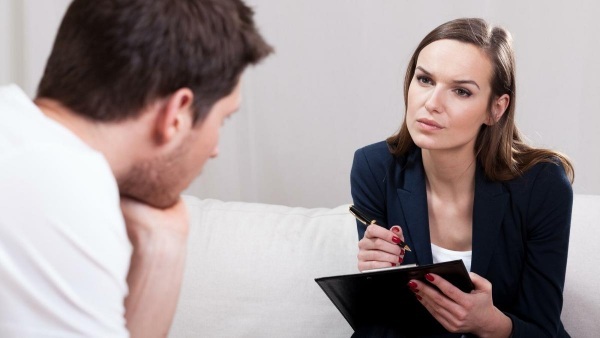
The techniques may differ depending on the characteristics of each person. Some are helped by visualization, in which fear closes in an impromptu virtual box in the subconscious of a person. The patient, at the slightest manifestation of anxiety, creates a picture in his head that allows him to cope with panic.
In the absence of panic attacks and a sluggish course of pathology, auto-training is used, that is, the technique of self-hypnosis. For several weeks, the patient visits a psychotherapist 3 times a week. At each session, the specialist helps the patient to believe in self-hypnosis, which ultimately leads to a cure.
Medication
Medications from different groups are used to treat a disorder with regular panic attacks. Tranquilizers help calm the patient, normalize the transmission of nerve impulses, weaken the manifestations of depression and completely eliminate anxiety. They are prescribed for a long course of the disease and the absence of the effect of psychotherapy.
The most effective remedies:
-
Phenazepam the action turns out due to the presence of the active component of the same name. It is prescribed in short courses of 2-4 weeks. Helps to improve the patient's condition and eliminate the most pronounced signs of the disorder. The medication is not used for allergies to its components, during pregnancy, lactation. Do not prescribe medicine for respiratory failure and shock.
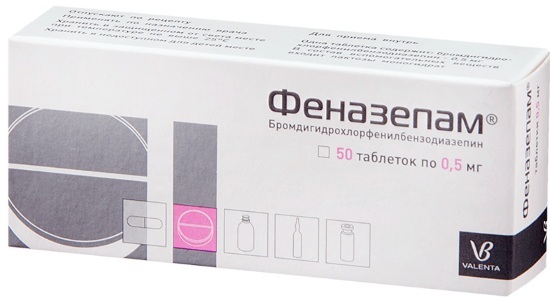
Phenazepam is a tranquilizer used to suppress attacks of anxiety-depressive disorder - Relanium - a solution based on diazepam, which has a pronounced muscle relaxant and sedative effect. Helps to cope with an attack of panic attack, relieves acute symptoms. Not used during pregnancy and breastfeeding, angle-closure glaucoma.
Antidepressants are used in combination with tranquilizers, but for long courses of 4-8 weeks, which is associated with a cumulative effect. These funds normalize sleep, improve mental activity, and eliminate anxiety. For panic attacks, remedies are indispensable, but sometimes they are also used for a sluggish course of the disorder.
Effective means of this group:
- Amitriptyline contains the active ingredient of the same name. It is used for neurological disorders, depression and other abnormalities. It is not prescribed for allergies to components, during lactation and pregnancy.
- Doxepin used for panic attacks, severe pathology. Contains doxepin as its main ingredient. Contraindicated in prostate adenoma, pregnancy and lactation. It is not used for myocardial infarction, severe damage to the liver, kidneys and hematopoietic system.
Beta-blockers are used to reduce heart rate, slightly lower blood pressure, and normalize heart rate. Usually prescribed for panic attacks. The most commonly used are Atenolol, Propranolol. The medicines contain components of the same name. They are appointed in short courses of 10-14 days.
Beta-blockers are not used for cardiogenic shock and chronic heart failure, as well as for bronchial asthma. They are contraindicated during pregnancy and lactation.
Homeopathy
Homeopathy is not used in panic attacks, but it is very effective in the sluggish course of pathology, as well as in its initial stages.
The most commonly used medications are:
- Traumeel S - homeopathic remedy based on a complex of herbal ingredients. It has a tonic and tonic effect. By improving well-being, the manifestations of the disorder are weakened. The tablets are taken for 4-8 weeks. Do not use the medicine in case of intolerance to its components, as well as severe lesions of the blood system.
-
Belladonna - a homeopathic preparation containing an extract of the plant of the same name. Often used for unexpressed anxiety-depressive disorders, it helps to relieve symptoms. It is not used for allergies to the components of the composition.
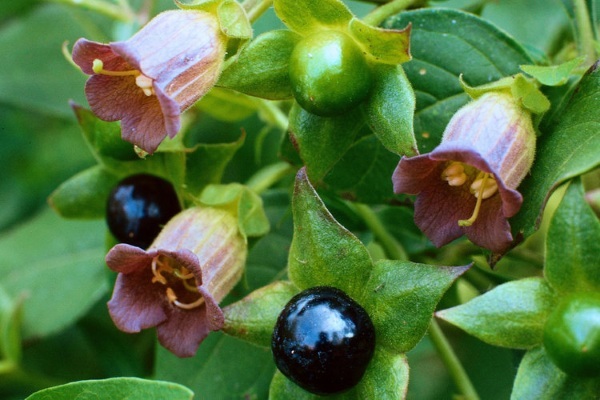
It should be noted that in case of panic attacks, the appointment of funds is impractical.
Physiotherapy
Among physiotherapeutic methods, it is worth highlighting therapeutic massage and electrosleep. These procedures relax the patient, improve sleep, and normalize the psycho-emotional state. They are carried out in a medical institution 3 times a week for 1-2 months, depending on the severity of symptoms.
Physiotherapy is not used for panic attacks, but can be prescribed after they have been stopped.
Other methods
Additional methods of therapy include lifestyle changes. The patient is encouraged to take up a hobby. Any activity that brings pleasure can distract a person from disturbing thoughts. If the process of avoiding negativity is fixed in the patient's brain, then the risk of a relapse of the disease will significantly decrease.
Additionally, doctors recommend playing sports. It is not necessary to exhaust the body with heavy loads, but swimming, running slowly or walking daily will help significantly improve the patient's condition.
If the physical manifestations disappear, the psychological symptoms will also become less pronounced. It is worth noting that today there are no radical methods of treatment that will help you instantly cope with the disease.
Folk remedies
Alternative medicine prescriptions usually include herbal formulations to help calm the patient and improve sleep.
Motherwort tincture is prepared from 100 ml of alcohol and 20 g of chopped herbs. It is necessary to insist on it for 2 weeks, then filter and take 20 drops 2 times a day. The duration of the course is up to 3 weeks.
A decoction of mint and lemon balm can be obtained from 500 ml of water, 3 g of dry mint leaves and the same amount of lemon balm. Cook the composition for 5 minutes, leave for 1 hour.

Take 200 ml of filtered broth before bedtime, repeat for 10 days in a row.
Chamomile infusion is also considered a mild sedative. You can get it from 5 g of dry raw materials and 350 ml of boiling water. It is necessary to insist the remedy for 20 minutes, filter and take it before bedtime. The duration of the course is 10-14 days.
Complications and consequences, prognosis
With timely detection of the disease, the prognosis is favorable. More than 65% of patients recover completely within 6-8 months. With an advanced disorder, the disease becomes chronic.
Usually, the condition does not provoke serious consequences. A chronic course can only lead to changes in a person's character. He becomes detached, avoids society, and minimizes contact with other people. In addition, a person's interest in life disappears. The most serious consequence is the appearance of suicidal thoughts, which can lead to a suicide attempt.
Anxiety-depressive disorder is a fairly common abnormality today, the symptoms of which significantly impair the patient's quality of life. When the first signs appear, it is recommended to immediately visit a doctor for examination and treatment.
Article design: Vladimir the Great
Anxiety Disorder Videos
Anxiety-depressive disorder and the factors that provoke it:



